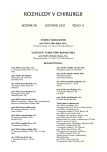-
Medical journals
- Career
Experimental Use of the Recipient’s Epithelial Cells in Tracheal Allotransplantation – Initial Outcomes
Authors: J. Belák 1; M. Kudláč 1; V. Ledecký 1; J. Rosocha 2; R. Tkáčová 3; Z. Ševčíková 5; I. Čavarga 4; A. Somoš 4
Authors‘ workplace: II. chirurgická klinika, UPJŠ, LF, Košice, Slovenská republika, prednosta: doc. MUDr. J. Belák, PhD. 1; Klinika malých zvierat, Univerzita veterinárskeho lekárstva a farmácie, Košice, Slovenská republika, prednosta: doc. MVDr. A. Trbolová, PhD. 2; Združená tkanivová banka, UPJŠ, LF, Košice, Slovenská republika, prednosta: MVDr. J. Rosocha, CSc. 3; Klinika pneumológie a ftizeológie, UPJŠ, LF, Košice, Slovenská republika, prednosta: prof. MUDr. R. Tkáčová, DrSc. 4; Ústav patologickej anatómie, Univerzita veterinárskeho lekárstva a farmácie, Košice, Slovenská republika, vedúci ústavu: prof. MVDr. M. Levkut, DrSc. 5
Published in: Rozhl. Chir., 2011, roč. 90, č. 11, s. 621-624.
Category: Monothematic special - Original
Overview
The management of long tracheal lesions requires development of tracheal implants, which would enable resection combined with anastomosis. The authors’ scientific study is based on tracheal allotransplantation on an animal model (sheep), using tracheal epithelial cells of the recipient. The project covers preparation of the graft, so that all components of the major histocompatibility complex (MHC), which participate in graft rejection, are removed.
Histological examination of the allograft with cultivated epithelial cells showed its good healing with revasculatization and with no signs of graft rejection.Key words:
surgery – trachea – allotransplantation
Sources
1. Fiala, P., Cernohorsky, S., Patek, J., Zatloukal, P. Trachealresektion bei Narbenstenosen. Zentralbl. Chir., 2002; 127 : 933–938.
2. Grillo, H. C., Donahue, D. M., Mathisen, D. J., Wain, J. C., Wright, C. D. Postintubation tracheal stenosis. Treatment and result. J. Thorac. Cardiovasc. Surg., 1995; 109 : 486–493.
3. Harustiak, S., Majer, I., Benej, R., Pereszlenyi, A., Bohucky, S., Jurakova, O., Dzuberova, I., Kajanovicova, V. Stenóza trachey a jej liečba. Bratisl. Lek. Listy, 1999, 100 : 291–295.
4. Pinera, J. G., Martinez, A. P., Macian, A. M., Olmo, D. G. An experimental model for the prevention of postanastomotic tracheal stenosis. J. Thorac. Cardiovasc. Surg., 1997; 114 : 76–83.
5. Tsukada, H., Osada, H. Experimental study of a new tracheal prosthesis: pored Dacron tube. J. Thorac. Cardiovasc. Surg., 2004; 127 : 877–884.
6. Aoki, T., Yamato, Y., Tsichida, M., Souma, T., Yoshiya, K., Watanabe, T., Hayashi, J. Successful tracheal transplantation using cryopreserved allografts in a rat model. Eur. J. Cardiothorac. Surg., 1999; 16 : 169–173.
7. Kushibe, K., Nezu, K., Nishizaki, K., Takahama, M., Taniguchi, S. Tracheal allotransplantation maintaining cartilage viability with long-term cryopreserved allografts. Ann. Thorac. Surg., 2001; 71 : 1666–1669.
8. Macchiarini, P., Mazmanian, G. M., De Montpreville, V. T., Dulment, E. M., Chapelier, A. R., Dartevelle, P. G. Maximal preservation time of tracheal allografts. Ann. Thorac. Surg., 1995; 60 : 1597–1604.
9. Nakanishi, R., Hashimoto, M., Umesue, M., Kohno, H., Yasumoto, K. Maximal period of cryopreservation with the bicell biofreezing vessel for rat tracheal isografts. J. Thorac. Cardiovasc. Surg., 1999; 117 : 1070–1076.
10. Dodge-Kathami, A., Niessen, H. W. M., Baidoshvili, A., van Gulik, T. M., Klein, M. G., Eijsman, L., De Mol, B. A. J. M. Topical vascular endothelial growth factor in rabit tracheal surgery: comparative effect on healing using various reconstruction materials and intraluminal stents. Eur. J. Cardiothorac. Surg., 2003; 23 : 6–14.
11. Liu, Y., Nakamura, T., Yamamoto, Y., Matsumoto, K., Sekine, T., Ueda, H., Shimizu, Y. Immunosupressant-free allotransplantation of the trachea: the antigenicity of tracheal grafts can be reduced by removing the epithelium and mixed glands from graft by detergent treatment. J. Thorac. Cardiovasc. Surg., 2000; 120 : 108–114.
12. Stoelben, E., Harpering, H., Haberstroh, J., Di Fillipo, A., Wellens, E. Heterotopic transplantation of cryopreserved tracheae in a rat model. Eur. J. Cardiothorac. Surg., 2003; 23 : 15–20.
13. Jadczuk, E. High doses of hydrocortisone improved tracheal autograft revascularization. Eur. J. Cardiothorac. Surg., 1998; 14 : 615–620.
14. Levashev, Y. N., Akopov, A. L., Mosin, I. V. The possibilities of greater omentum usage in thoracic surgery. Eur. J. Cardiothorac. Surg., 1999; 15 : 465–468.
15. Li, J., Xu, P., Chen, H., Yang, Z., Zang, Q. Improvement of tracheal autograft survival with transplantation into the greater omentum. Ann. Thorac. Surg., 1995; 60 : 1592–1596.
16. Moriyama, H., Sasajima, T., Hirata, S., Yamazaki, K., Yatuyanagi, E., Kubo, Y. Revascularization of canine cryopreserved tracheal allografts. Ann. Thorac. Surg., 2000; 69 : 1701–1706..
17. Delaere, P. R., Liu, Z. Y., Hermans, R., Sciot, R., Feestra, L. Experimental tracheal allograft revascularization and transplantation. J. Thorac. Cardiovasc. Surg., 1995; 110 : 728–737.
Labels
Surgery Orthopaedics Trauma surgery
Article was published inPerspectives in Surgery

2011 Issue 11-
All articles in this issue
- Acute Mediastinitis
- Lung Transplantation
- Experimental Use of the Recipient’s Epithelial Cells in Tracheal Allotransplantation – Initial Outcomes
- Are There Any News in the Management of Spontaneous Pneumothorax?
- Is Pneumonectomy Justified in the Management of Lung Metastases?
- Spontaneous Pneumomediastinum – A Case Review
- Principles of the Thoracic Wall Injury Management
- Penetrating Thoracic and Abdominal Injuries: Diagnostic and Therapeutic Approach
- Esophageal Perforation
- Rates of Metastatic Affections of Mediastinal Nodes During Pulmonary Metastasectomy
- Right Ventricular Perforation by a Rib Fragment Following Blunt Thoracic Trauma
- Perspectives in Surgery
- Journal archive
- Current issue
- Online only
- About the journal
Most read in this issue- Acute Mediastinitis
- Lung Transplantation
- Esophageal Perforation
- Are There Any News in the Management of Spontaneous Pneumothorax?
Login#ADS_BOTTOM_SCRIPTS#Forgotten passwordEnter the email address that you registered with. We will send you instructions on how to set a new password.
- Career

